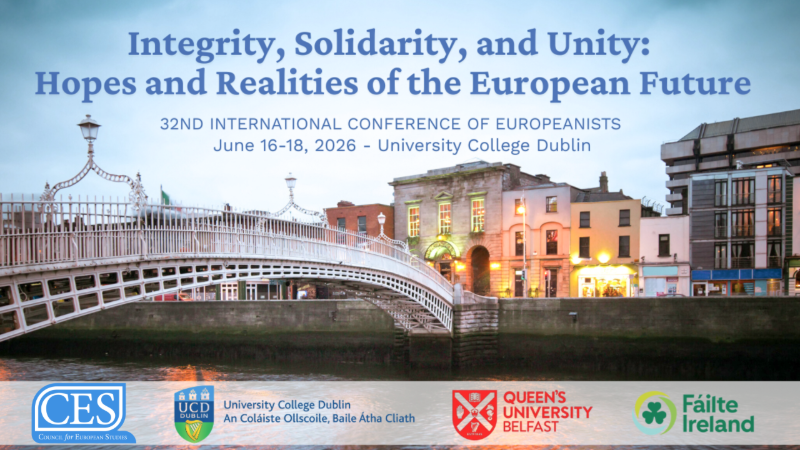
Conference date: June 16-18 2026
Location: University College Dublin
Conference co-chairs: Karen Anderson (UCD), Imelda Maher (UCD), and David Phinnemore (Queen’s University Belfast)
Application portal is open NOW >>>> (opens in a new window)click here to submit your application using the OpenWater conference platform
Deadline for applications: 15 October 2025
For detailed instructions for submission, see the (opens in a new window)conference portal
In June 2026, UCD will host the 32nd International Conference of Europeanists, which promises to be an exciting opportunity for collaboration and exchange - bringing together scholars from around the globe to address the future of European integration. Professors Imelda Maher and Karen Anderson of the Dublin European Institute will act as co-chairs of this conference, alongside David Phinnemore of Queen’s University Belfast. Notably, the conference will commence on Bloomsday; the day in which we celebrate the work of UCD’s most famous alumnus, James Joyce.
The theme of the conference is as follows:
‘Integrity, Solidarity, and Unity: Hopes and Realities of the European Future’
‘European society, politics, law, and culture are imbued with shared ideas of integrity, solidarity, and unity. The end of the Cold War redrew the map of Europe as once oppressed societies gained independence and territorial integrity after decades, or even centuries of domination. But integrity was not simply related to borders, it was inextricably linked to solidarity– the idea that European countries would join together to promote social progress and democracy through shared ideas and institutions advancing European unity, however defined. Solidarity also captures Europe’s efforts to build social and political institutions — the welfare state broadly defined — to provide collectively financed and organized social protections. Indeed, the “European Social Model” no matter how flawed, is for many the standard against which all advanced democratic societies should be judged. Similarly, solidarity implies individual autonomy embodied in shared values such as fundamental rights and the right to social protection.
European hopes around integrity, solidarity, and unity rest on loosely shared understandings of what the future should hold. Dashed hopes of the past show the importance of embedding individual and collective hopes in values of integrity and solidarity and in social and political realities. Seeking to realize hope through agency and an articulation of shared goals creates space for the exploration and realization of potential futures for Europe. The integrity of collective hopes grounded in shared values also means reimagining European futures in response to realities. Indeed, Russia’s war against Ukraine, the radical reorientation of US policies toward Europe since January 2025, and the increasing flow of migrants and refugees from outside of Europe are daunting realities.’
CES invites papers, panels, roundtables, along with other forms of presentations which explore these themes, from both a multidisciplinary and multilevel perspective. Submissions may cover other topics relating to European Studies. CES welcomes the inclusion of underrepresented groups and early-career scholars.
The conference is organised on an all-island basis, and therefore aims to highlight the extensive richness of scholarship existing both in Ireland and Northern Ireland, in a post-Brexit world.
For more information, see the (opens in a new window)CES webpage here